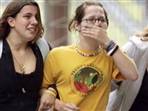 This post was written several years ago (2006). . . it is one in a series. I'm weary of repeating myself about this issue, but today it's painfully clear that we still need to talk about it all. As we grieve for the families of students from Stoneman Douglas High School in Broward County, Florida, we may wonder what happens in a school lockdown. . .
This post was written several years ago (2006). . . it is one in a series. I'm weary of repeating myself about this issue, but today it's painfully clear that we still need to talk about it all. As we grieve for the families of students from Stoneman Douglas High School in Broward County, Florida, we may wonder what happens in a school lockdown. . .Today was my first day back on the job as a classroom teacher after ten years. We had a faculty meeting and the topic of the day was crisis intervention procedures.
In the shadow of the recent school shootings, the safety of our student body and staff was uppermost in our minds. We ran through the list of things we, as teachers, are responsible to know how to handle. It goes way beyond fire and tornado drills. Here's a sampling:
- Trespassers on campus
- Serious injury or unexpected death
- Suicide, suicide threat, and suicide attempt
- Suspicion of gun
- Hostage situation
- Bomb threat
Do you?
If your child attends a public school, he probably has experienced a LOCKDOWN drill. As a parent, it never even occurred to me to ask.
After today's faculty meeting, I know ALL, and I think it's important that every parent know as well.
Here's what happens. A staff member calls "Students and staff, we are in a lockdown" and then teachers take on the responsibility for what happens next.
- Lock all classrooms, media center, cafeteria, gym and pod doors.
- Turn off all lights, close blinds, and cover your door window if you have one.
- Ignore all bells, whistles, fire alarms (unless there's smoke).
- Once your door is locked, your door remains locked. DO NOT OPEN IT TO ANYONE. Even if the police, the principal or student comes and knocks on the door - DO NOT OPEN THE DOOR!
- Keep students completely silent. Any noise will give away your position to an intruder.
- Know where all your students are at all times.
- Once the lockdown is over, staff will come to your class and unlock your door. If no one comes to unlock your door, the lockdown is NOT over.
Once you hear, either through a school communication system or on the news, that your child's school is in LOCKDOWN, you will probably experience a strong sense of panic and protectiveness. At this point, it's important that you don't do anything that might endanger your child or anyone else at the school. How might this happen?
- Calling your child on their cell phone during a lockdown makes NOISE and can give away their position. DO NOT CALL YOUR CHILD. Text them instead.
- Don't show up at the school expecting to pick up your child. They will not let him out if the school is in lockdown. Stay out of the way of emergency workers. It will only distract them from doing what they need to do - keep your child safe.
Yes, this is the world we live in. Although I suspect that schools in England, Ireland, Israel, Iraq, and Iran might have a slightly different set of procedures.
Then talk to your kids and make sure they know what they're supposed to do. My 16 year old told me that they did have a LOCKDOWN drill but the kids weren't quiet and didn't take it seriously. We need to remind our children that "obedience keeps you safe." They need to listen to their teachers and do exactly as they're told.
And he didn't know what he was supposed to do if he was out in the hallway when the LOCKDOWN is called.
Does yours?


